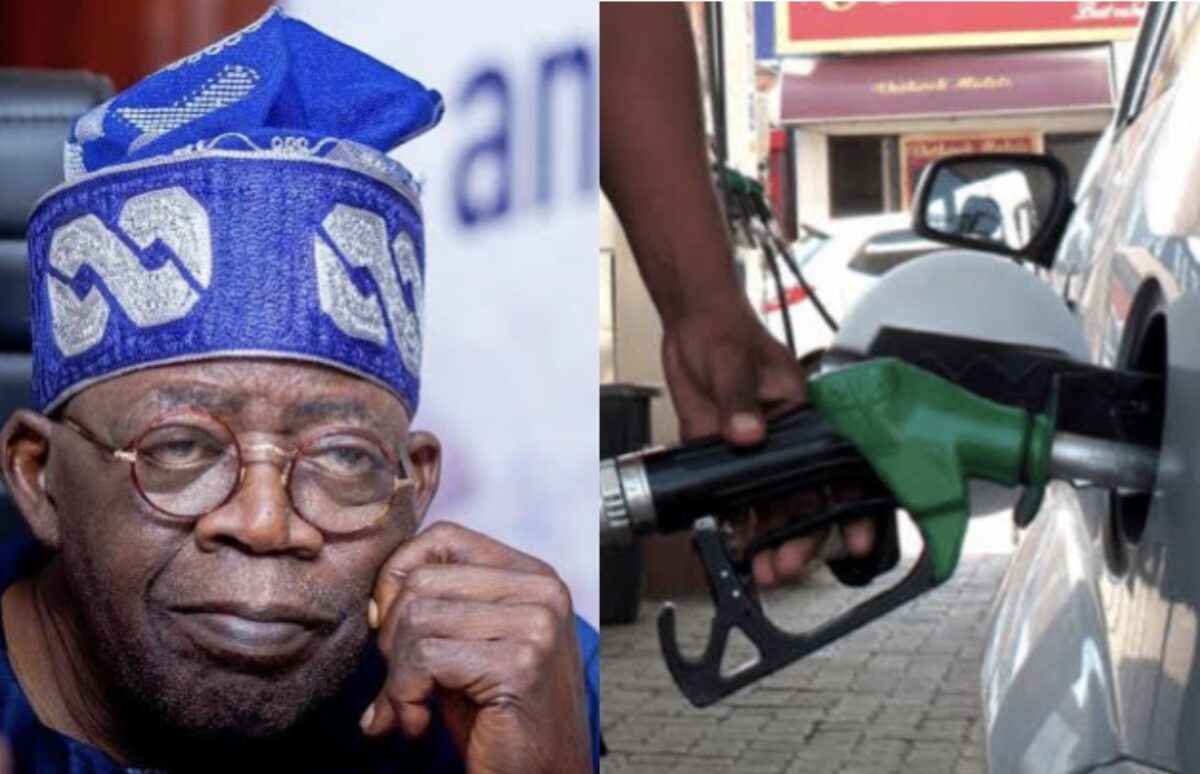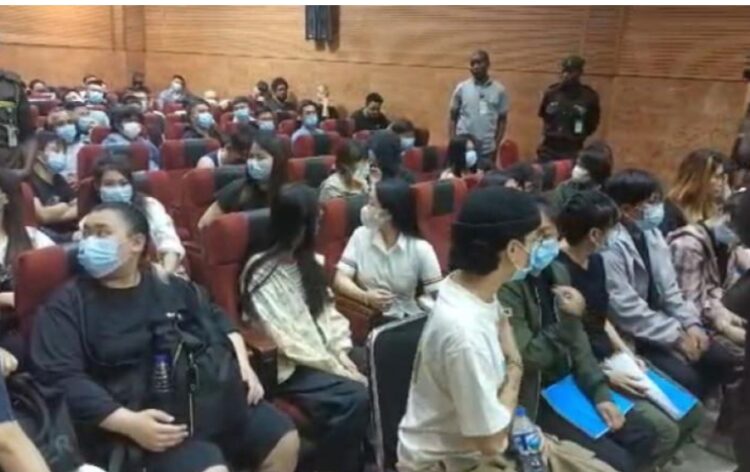News
FG Pays N1 Trillion Monthly As Petrol Subsidy — Pinnacle Oil MD

In a revelation that underscores the ongoing challenges in Nigeria’s oil sector, Pinnacle Oil and Gas Limited has disclosed that the country is incurring about N1 trillion every month on petrol subsidies.
This disclosure was made by the Managing Director/CEO of the indigenous oil and gas company, Robert Dickerman, during the Nigeria International Energy Summit (NIES) held in Abuja.
Despite the government’s efforts towards deregulation in the downstream sector, the persistence of such a hefty subsidy indicates a significant financial burden on the nation’s economy.
The subsidy mechanism, intended to make petrol affordable for Nigerians, has inadvertently resulted in the product being cheaper within the country compared to neighbouring nations.
This price disparity has been identified as a key driver for the smuggling of petrol across borders, further complicating the subsidy issue.
Speaking at the forum’s panel session six, which focused on Nigeria’s Downstream Sector, Dickerman highlighted the paradox that, despite substantial progress in the industry, the massive subsidy is a clear indication of the challenges still facing Nigeria’s oil and gas sector.
He said the situation not only affects the government’s finances but also impacts the operational dynamics of companies within the sector, like Pinnacle Oil and Gas, which operates across the entire downstream value chain.
Dickerman stated that the continued payment of subsidies at such a scale raises questions about the sustainability of such expenditures and the need for more effective policies to address the underlying issues.
He said, “Nigeria has a long history of allocating resources to oil and gas production at the expense of most other economic and social programs. To balance this, there has been a long-standing policy to mitigate consumer costs via palliatives such as fuel and food subsidies.
“But one of the net effects of oil money is underinvestment in local production, manufacturing and other value-added activities that could generate foreign currency through exports. There has also been a large under investment in the maintenance and upgrade of existing infrastructure including electricity, roads, health care, water, waste, education and financial infrastructure such as consumer credit.
As a result, we have a huge negative trade deficit, except for crude oil and LNG, and our banks are not sufficiently capitalized to support significant new capital programs.
“With legacy monetary policymaking currency exchange difficult, we desperately need Foreign Investment. This is a reality. So the best policy during this time of crisis is a national policy to transform our economy/regulations/laws to accommodate and encourage FDI.
“Foreign investors, foreign lenders and government-run DFIs have been very clear about what they want to see: Conservative fiscal policy, tackling corruption, enabling competitive markets, and enforcement of fairness in markets through policy, regulation and the ability to enforce contracts. Keeping that context in mind, I want to point out that there is still a massive subsidy in PMS, albeit in the FX portion of PMS Price, not the global price in dollars.
“The consequences of this subsidy are: The cost of gasoline in Nigeria is the lowest in Africa by far, which encourages smuggling out, further depriving Nigeria of value. Smuggling causes Nigeria to subsidize neighbouring countries even while our economy struggles. The cost is hurting the entire budget, Federal and State, as critical programs cannot be funded to pay this subsidy. It is currently calculated to be about 1 trillion Naira/month.
“Also, with this subsidy in place, ceasing subsidy payments would result in no petrol supply, if there are no refineries producing gasoline. All supplies come from the international market, which will only sell at market prices.
“There is no competition in bulk supply, as only the national champion owned by the government can import. Wholesale and retail prices are set based on their subsidized cost and they determine who gets supply. Without a competitive market, foreign investors are discouraged from investing in this sector in Nigeria.
“The solution to this problem seems obvious, even acknowledging the daily struggles most citizens and companies have today with reduced purchasing power, high inflation, high interest costs and high unemployment that exists today. Short-term palliatives have never resolved long-term issues in any nation at any time in history. We need long-term solutions.”
News
WAR against scam: FG arraigns 130 foreigners, others for alleged cybercrime

The Federal Government will on Friday arraign 130 suspects comprising 113 foreign nationals (87 males and 26 females), predominantly of Chinese and Malaysian origin, and their 17 Nigerian collaborators (4 males and 13 females) for their alleged involvement in high-level cybercrimes, hacking, and activities that threaten national security.
The Nigeria Police Force had arrested the suspects in an operation that was conducted through a coordinated raid on a building at the Next Cash and Carry area of Jahi, Abuja, reports Channels TV.
The suspects were reportedly using computers and other sophisticated devices to facilitate criminal activities.
The operation which was led by the Assistant Inspector-General of Police for Zone 7 Headquarters, Abuja, AIG Benneth Igweh, on Saturday, 3rd November 2024, comprised officers of the Nigeria Police Force Zone 7 Command Abuja and the National Cyber Crime Centre (NPF-NCCC).
The suspects are to be arraigned before Justice Ekerete Akpan of the Federal High Court.
News
Manufacturers hold AGM in Enugu, suggest ways to revive Nigeria’s economy(Photos)

Stakeholders in the manufacturing sector have called for urgent investment and strategic support to revitalise Nigeria’s economy through non-oil exports.
The appeal was made at the 36th Annual General Meeting of the Manufacturers Association of Nigeria (MAN), Anambra/Ebonyi/Enugu Chapter, held in Enugu on Friday, themed “Revitalising Nigeria’s Economy Through Manufacturing-Driven Non-Oil Export.”
Chairperson of the MAN chapter, Lady Ada Chukwudozie, emphasised the pressing need for Nigeria to shift from its oil-dependent economy by strengthening the manufacturing sector.
She highlighted that the nation’s overreliance on oil has exposed it to challenges like price volatility, environmental degradation, and limited economic diversification.
“To ensure economic sustainability, Nigeria must prioritise manufacturing-driven non-oil export strategies, as seen in countries like Singapore, where innovation and research have propelled their manufacturing sector to global competitiveness,” Chukwudozie stated.
She further urged the government to implement supportive policies, such as tax incentives, improved access to financing, and investment in critical infrastructure.
Keynote speaker and former Director-General of the Nigerian Maritime Administration and Safety Agency (NIMASA), Dr Dakuku Peterside, described manufacturing as the “master key” to addressing Nigeria’s economic challenges.
“Export-driven manufacturing can reduce our vulnerability to oil price fluctuations, generate revenue, and create jobs,” Peterside said, while advocating for infrastructure development, stable monetary policies, and power sector reforms to support manufacturers.
Anambra State’s Deputy Governor, Dr Onyekachukwu Ibezim, called for collaboration among Southeast states to leverage their comparative advantages. He cited Anambra’s agricultural revolution in palm and coconut production as an example of non-oil sector innovation.
The event also featured awards to distinguished individuals and highlighted the urgent need for a united approach to reposition Nigeria’s manufacturing sector as a driver of economic growth.
News
Afenifere Hammers Tinubu Over Economic Hardship

Yoruba socio-political group, Afenifere, in the United Kingdom and Europe, has said that the “no pain, no gain” philosophy of the President Bola Tinubu-led government has reached its limit across the nation.
In a statement issued on Friday by its Secretary, Engineer Anthony Ajayi, in London, United Kingdom, the group acknowledged that while the current economic struggles were inherited from the previous administration of Muhammadu Buhari, some policies introduced by the Tinubu’s government have exacerbated the situation and require urgent review to alleviate the hardship.
Afenifere warned that if the situation worsens, many Nigerians could face even greater difficulties in their daily lives.
The group called on President Tinubu to use the remaining days of 2024 to prioritise the review of his policies and governance style in order to provide relief to the people by 2025.
It also urged both federal and state governments to introduce palliative measures to ease the suffering of Nigerians, especially during the holiday season.
“The time to get serious about good governance is now. Nigerians have suffered enough, and the situation cannot become any worse than it already is.
“This hardship is not just limited to those within Nigeria; Nigerians abroad are also feeling the impact. We urge President Tinubu to demonstrate leadership, put aside political agendas, and position himself positively in history.
“While he inherited many of these challenges from Buhari, he must show the capacity and resolve to lead,” the statement read.
On the President’s proposal to borrow an additional N1.77 trillion to cover the N9.7 trillion budget deficit for 2024, Afenifere expressed strong opposition, warning that continued borrowing would further devalue the Naira and damage the national economy.
The group stressed that borrowing is not a viable solution, given Nigeria’s heavy reliance on imports.
“We are not against borrowing in principle, but the question remains: what has the borrowing achieved? If the money borrowed only leads to more suffering for the masses, then the purpose of borrowing is defeated.
“Borrowing would be more justifiable if it were used prudently to improve infrastructure, foster industrial growth, and strengthen the economy.
“President Tinubu should consider bringing in creative and innovative economic technocrats into his cabinet, similar to the approach taken by the UK, to curb further borrowing.
“The UK government no longer needs to borrow; it can create money at will through the Bank of England.
“This model of economic management should be studied and adapted by Nigeria to break the cycle of borrowing.”
Afenifere also highlighted Nigeria’s potential, urging the government to create an enabling environment for the industrious and hardworking population to contribute more effectively to the national economy.
The group expressed optimism about the progress made with the Port-Harcourt refinery, noting that it was nearing 70% completion and could soon begin operations.
They however commended President Tinubu for achieving this milestone, which was previously unattainable by past administrations.
“If all nine of Nigeria’s refineries were fully operational, there would be a significant improvement in the Naira’s value and the overall economy.
“The federal government must continue to foster the right conditions for such progress,” the statement added.
Afenifere called on Nigerians both at home and abroad to hold their state governors accountable for how they are utilizing the funds allocated to them.
“State governments are closer to the people, and it is important that we not only pressure the federal government but also hold our state governors to the same standard. We must ensure that the resources sent to the states are used effectively for the welfare of the citizens,” the group concluded.
-

 Sports20 hours ago
Sports20 hours agoReal Madrid coach involved in auto crash after Liverpool bashing
-

 Metro20 hours ago
Metro20 hours agoArmy kills 4 suspected terrorists in Abia
-

 News18 hours ago
News18 hours agoFinnish court to begin trial of Simon Ekpa May 2025
-

 News19 hours ago
News19 hours agoHiker Missing For Over A Month Found Alive In Canadian Wilderness
-

 Economy13 hours ago
Economy13 hours agoCurrent Black Market Dollar (USD) to Naira (NGN) Exchange Rate
-

 Health20 hours ago
Health20 hours agoNAFDAC warns Nigerians of fake anti-malaria drugs in circulation
-

 News19 hours ago
News19 hours agoReps confirm Oluyede as Army Chief
-

 News19 hours ago
News19 hours agoWatch Gov Adeleke’s latest dancing steps as he marks second year in office












